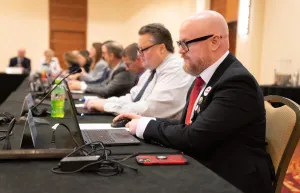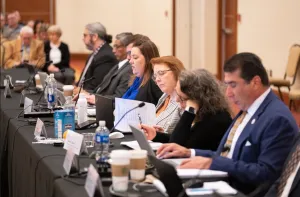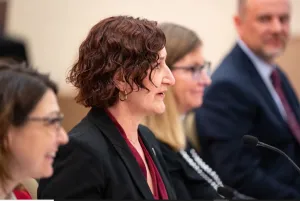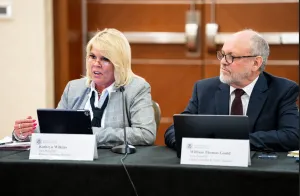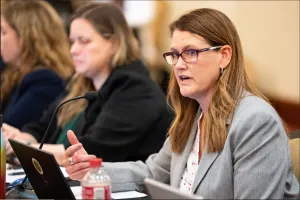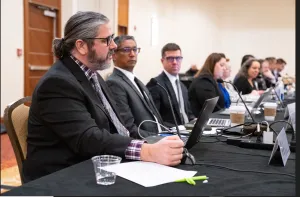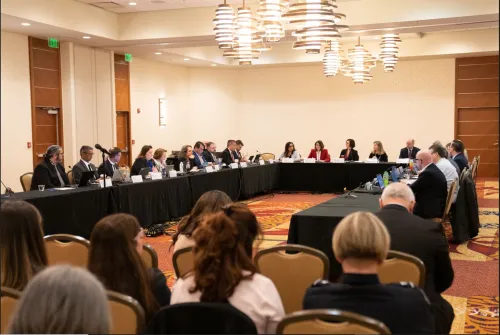No rain was in the forecast when the 16th term of U.S. Customs and Border Protection’s trade advisory committee met in Seattle on March 29. It also was smooth sailing indoors when the members of the Commercial Customs Operations Advisory Committee discussed the country’s most pressing trade issues at their first public meeting this year.
The meeting opened with remarks delivered virtually by CBP Acting Deputy Commissioner Benjamine C. Huffman. “I’d like to start by noting a truly meaningful milestone for CBP. On March 1, CBP alongside the Department of Homeland Security, celebrated our 20th anniversary. An important part of this legacy is our role in trade facilitation and trade enforcement. It’s a tremendous job, one in which we take enormous pride,” said Huffman. “Our Office of Field Operations, Office of Trade and Office of Trade Relations are deeply engaged in virtually every sector of the global economy, and the past two decades have clearly shown how integral our mission is to the nation’s economic health and the safety and security of the global supply chain.”
Virginia Brown, the U.S. Department of Treasury’s tax legislative counsel, also underscored the significance of the event. “The 20th anniversary of the creation of CBP provides an opportunity to reflect on how much has been achieved in the past two decades by CBP with COAC’s input and participation. It also presents the opportunity to consider our evolving trade landscape and shifting challenges for security and trade facilitation,” said Brown.
“COAC and its scores of private sector members over the past two decades have provided instrumental contributions to DHS, CBP and the Department of Treasury,” Brown said. “Although many issues have changed, the overarching themes and the need for partnership and constructive dialogue to balance security and trade facilitation have remained and will continue as we embark on the next 20-year journey.”
In his opening remarks, Huffman also spoke about Ian Saunders, the U.S. candidate nominated for secretary general of the World Customs Organization. Saunders, the current deputy assistant secretary for the Western Hemisphere at the U.S Department of Commerce, served in numerous leadership roles at CBP and began his career at its legacy agency, the U.S. Customs Service.
“As part of our commitment to global cooperation, CBP has long recognized that the World Customs Organization provides a unique venue for strengthening global trade facilitation and security partnerships,” said Huffman. “CBP is ever mindful that our collective efforts through the WCO contribute to economic and security efforts worldwide.”
“Deputy Assistant Secretary Saunders is well-known and respected within the WCO community thanks to his long experience with the organization, including his prior exemplary service as chair of the WCO’s Permanent Technical Committee and his service as CBP’s assistant commissioner of International Affairs, where he truly embodied CBP’s core values of vigilance, service and integrity, said Huffman. “Ian’s customs experience, technical knowledge, experience at the WCO, linguistic proficiencies and leadership in multiple U.S. government agencies make him the ideal candidate for WCO secretary general.”
Huffman also explained that CBP is heavily engaged with regional economic forums that are critical to securing and facilitating cross-border trade. He cited the Asia-Pacific Economic Cooperation as an example. “The United States will host all of APEC’s meetings in 2023,” said Huffman. “As of 2021, APEC economies were the destination for more than 60% of exported U.S. goods and seven of the top 10 overall trading partners for the United States are APEC economies.”
Huffman noted that CBP has been honored to serve as the chair of the APEC Subcommittee on Customs Procedures during 2023. The subcommittee supports trade facilitation and trade security measures, which promote inclusive growth and create more connected, secure and resilient global supply chains across the Asia-Pacific region.
“As the Subcommittee on Customs Procedures chair, the U.S. will host the APEC Customs Business Dialogue to bring customs officials from the APEC region and trade community together,” said Huffman. The dialogue’s theme, “Women in Trade,” will take place in Seattle in early August and focus on promoting inclusive trade.
Huffman also shared that CBP hosted the Forced Labor Technical Expo in Washington, D.C., on March 14-15. The expo was a global platform for industry to share best practices on the latest technologies in supply chain transparency from around the world. The event drew approximately 250 in-person participants from industry, civil society, partner government agencies and foreign governments. Virtual livestream data from the event showed more than 9,000 views.
“CBP is committed to working with the trade industry as they navigate complex global supply chains to ensure that the goods entering the United States comply with U.S. trade laws and that workers around the world are treated with the dignity and humanity they deserve,” said Huffman.
Robert Hammer, the special agent in charge of Homeland Security Investigation’s Pacific Northwest region, spoke about his agency’s partnership with CBP. “We have offices across the entire Pacific Northwest, but really we focus on the offices where we can partner with CBP. We have taskforce officers from CBP embedded into our investigations, leveraging the unique data that CBP has access to uncover the schemes and illicit manipulation of the trade here in this region,” said Hammer. “It all comes down to people are our most important resource. And when we put our people together, great things have been happening.”
Hammer shared that the collaboration between HSI and CBP has resulted in some of the agencies’ most complex investigations. “This past year alone we’ve seen the importation of illegally harvested and misdeclared lumber. A significant amount of that timber came from two companies that were alleged to not only have been involved in the illegal harvest, but also were suspected of being involved in corruption and tax evasion,” Hammer said. “CBP personnel provided extensive import analysis, which led to the identification and seizure of over 13 containers containing illegally harvested wood veneer.”
Another investigation was initiated by CBP’s seizure of multiple shipments of counterfeit goods destined for a Seattle area residence. “Leveraging our undercover authority, we made multiple undercover purchases from this individual and ultimately did a search warrant of the business, resulting in over $2 million of counterfeit goods that were being sold online,” said Hammer. “That individual was charged federally.”
Equally as stunning were the results of a joint operation known as Operation Northern Lights, which Hammer explained protects the U.S. against goods that pose a public safety concern such as illegal firearms parts and counterfeit pharmaceuticals that are flowing into the country. “I’m proud to say that just last year alone in 2022, and I’ll give CBP credit for this, they had over 2,000 illicit shipments that were seized and referred to us for investigation,” said Hammer. “This resulted in over 150 controlled deliveries across the United States. The estimated manufacturer’s retail price of the goods that were seized just in Alaska alone was over $14 million and the Northern Lights seizures have resulted in over 20 arrests across the country.” Hammer added that “millions upon millions of fentanyl pills and related substances have been seized through our collective efforts here between CBP and HSI related to fentanyl substances coming in through illicit trade. And so, that remains a high priority focus for us. At every level, cooperation between HSI and CBP serves as the basis for many of our respective lines of effort and improves our overall output.”
Speaking on behalf of the COAC, trade co-chair Kathryn Wilkins, the vice president of logistics consulting firm Alliance Operating Services, expressed the committee’s appreciation. “COAC would really like to say how much we appreciate the opportunity to meet with you in these public forums and review the progress in the working groups and what we have achieved as a whole. It’s important for us to be able to sit down with you and discuss face to face the key matters as well as the opportunity to participate in the proposed solutions,” said Wilkins. “Today, we are bringing eight recommendations to the table. These are very thoughtful and well-crafted, and we believe they will assist both trade and CBP with a more progressive and secure environment as well as enhance communications and data sharing.”
All eight recommendations were unanimously passed. Three of the recommendations pertained to cross-border facilitation, three addressed in-bond issues, one focused on export modernization and one concerned the U.S.-Mexico-Canada Agreement. The meeting also included updates on trade programs and COAC subcommittee work.
Announcements were made regarding the upcoming CBP Trade Facilitation and Cargo Security Summit, which will be held April 17-19 in Boston, and the next COAC meeting, scheduled for June 14.
Additionally, an announcement was made that CBP will be publishing a Federal Register Notice by the end of April to solicit applicants for COAC’s 17th term.
COAC is a 20-member advisory committee that was established by Congress in 1987. The committee provides advice and recommendations to CBP and the Department of the Treasury on the commercial operations of CBP and trade-related interdepartmental functions. Some of the issues that COAC focuses on include enhanced border and supply chain security, international efforts to harmonize customs practices and procedures, import safety, compliance, and modernization and automation processes used to facilitate trade.


